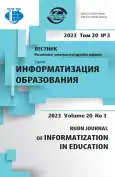Using 3D-modeling to improve the quality of bachelors’ training in the field of socio-cultural activities
- Autores: Ascheulova A.V.1, Gribkov D.N.2, Mamaeva E.A.3, Nimatulaev M.M.4
-
Afiliações:
- Secondary School No. 10
- Orel State Institute of Culture
- Vyatka State University
- Financial University under the Government of the Russian Federation
- Edição: Volume 20, Nº 3 (2023)
- Páginas: 316-327
- Seção: EVOLUTION OF TEACHING AND LEARNING THROUGH TECHNOLOGY
- URL: https://journal-vniispk.ru/2312-8631/article/view/321267
- DOI: https://doi.org/10.22363/2312-8631-2023-20-3-316-327
- EDN: https://elibrary.ru/CTFMPJ
- ID: 321267
Citar
Texto integral
Resumo
Problem statement. The implementation of 3D modeling elements in the in-demand specialists’ training of the socio-cultural sphere is in line with the recommendations of UNESCO and the priorities of Russia’s state cultural policy. The study aimed at substantiating the effectiveness of the three-dimensional computer graphics usage for specialists’ training to improve the quality of their education. Methodology . Theoretical and methodological analysis and generalization of fundamental scientific works on the research problem, processing of test results, and three-dimensional models of cultural objects are applied. The pedagogical experiment involved 49 students of the direction of training 51.03.03 Socio-cultural Activities (level - bachelor’s degree) of Orel State Institute of Culture. Pearson’s χ2 test was used as a statistical processing method. Results . The features of the use of three-dimensional computer graphics in the training of specialists in the socio-cultural sphere to improve the quality of their training are determined: activation of information communication; support for solving economic and engineering problems as components of socio-cultural activities; automation of a large number of calculations, etc. Statistically significant differences in qualitative changes in the pedagogical system were revealed. Conclusion . The use of three-dimensional computer graphics in the training of specialists in the socio-cultural sphere will help to increase the level of their professional training while providing a set of conditions: a combination of design, educational and research activities; orientation to the performance of labor functions; application of fundamental theoretical information on technologies for organizing leisure activities in real socio-cultural activities, etc.
Sobre autores
Anna Ascheulova
Secondary School No. 10
Email: krlv_sh10@mosreg.ru
ORCID ID: 0000-0003-2595-0080
teacher
5 Dzerzhinskogo St, Korolev, 5141075, Russian FederationDmitry Gribkov
Orel State Institute of Culture
Email: bibliotekar2005@mail.ru
ORCID ID: 0000-0002-3388-9526
Cand. Sci. (Educ.), Associate Professor, Head of the Department of Informatics and Records Management, Faculty of Library, Information and Museum Activities
15 Leskova St, Orel, 302020, Russian FederationEkaterina Mamaeva
Vyatka State University
Autor responsável pela correspondência
Email: mamaevakathy@gmail.com
ORCID ID: 0000-0002-7721-8820
senior lecturer, Department of Digital Technologies in Education, Faculty of Computer and Physical and Mathematical Sciences in Education
36 Moskovskaya St, Kirov, 610000, Russian FederationMagomedkhan Nimatulaev
Financial University under the Government of the Russian Federation
Email: mnimatulaev@fa.ru
ORCID ID: 0000-0003-4290-6073
Doctor of Pedagogical Sciences, Professor of the Department of Business Informatics
49 Leningradsky Prospekt, Moscow, 125993, Russian FederationBibliografia
- Kuznetsova ТF. Digitalization and digital culture. Horizons of Humanitarian Knowledge. 2019;(2):96-102. (In Russ.) http://doi.org/10.17805/ggz.2019.2.7
- Grinshkun VV. Problems and ways of informatization technologies in education effective use. Moscow University Pedagogical Education Bulletin. Series 20: Pedagogical Education. 2018;(2):34-47. http://doi.org/10.51314/2073-2635-2018-2-34-47
- Yaroshenko NN. Pedagogical implementation of the concept of “social and cultural activity”. Bulletin of Moscow State University of Culture and Arts. 2021;(5):124-136. http://doi.org/10.24412/1997-0803-2021-5103-124-136
- Terzidou T, Tsiatsos Τ, Apostolidis H. Multimed architecture and interaction protocol for pedagogical-empathic agents in 3D virtual learning environments. Multimedia Tools and Applications. 2018;77:27661. http://doi.org/10.1007/s11042-018-5942-4
- Forman J, Dogan MD, Forsythe H, Ishii H. DefeXtiles: 3D printing quasi-woven fabric via under-extrusion. UIST '20: Proceedings of the 33rd Annual ACM Symposium on User Interface Software and Technology. New York, NY: Association for Computing Machinery; 2020. p. 1222-1233. http://doi.org/10.1145/3379337.3415876
- Soboleva EV, Suvorova TN, Zenkina SV, Bocharov MI. Professional self-determination support for students in the digital educational space. European Journal of Contemporary Education. 2020;9(3):603-620. http://doi.org/10.13187/ejced.2020.3.603
- Jääskelä P, Nykänen S, Tynjälä P. Models for the development of generic skills in Finnish higher education. Journal of Further and Higher Education. 2018;42(1):130-142. http://doi.org/10.1080/0309877X.2016.1206858
- Benzer AI, Yildiz B. Developing an Attitude scale for three-dimensional modeling and 3D modeling course: a validity and reliability. Journal of Computer and Education Research. 2020;8(16):688-704. http://doi.org/10.18009/jcer.749364
- Liu B, Wu Y, Xing W, Guo Sh, Zhu L. The role of self-directed learning in studying 3D design and modeling. Interactive Learning Environments. 2023;31(3):1651-1664. http://doi.org/10.1080/10494820.2020.1855208
- Hancock P, Kaplan A, Cruit J, Endsley M, Beers S, Sawyer B, Hancock P. The effects of virtual reality, augmented reality, and mixed reality as training enhancement methods: a meta-analysis. Human Factors. 2021;63(4):706-726. http://doi.org/10.1177/0018720820904229
- Kim J-H, Nguyễn N, Campbell R, Yoo S, Taraban R, Reible D. Developing reflective engineers through an arts-incorporated graduate course: a curriculum inquiry. Thinking Skills and Creativity. 2021;42:100909. http://doi.org/10.1016/j.tsc.2021.100909
- Christos S, Epameinondas A, Georgios T, Stefanos Z, Maja P. 300 faces in-the-wild challenge: database and results. Image and Vision Computing, 2016;47:3-18. http://doi.org/10.1016/j.imavis.2016.01.00
- Mamaeva EA, Isupova NI, Masharova TV, Vekua NN. Modeling in the environment of three-dimensional graphics as a method of forming students’ critical thinking. Perspectives of Science and Education. 2021;50(2):431-446. http://doi.org/10.32744/pse.2021.2.30
- Mamaeva EA, Suvorova ТN. Foreign experience of implementation of 3D modeling and rapid prototyping for forming digital competencies. Informatics in School. 2020; (7):18-20. (In Russ.) http://doi.org/10.32517/2221-1993-2020-19-7-18-20
- Kamariotou V, Kamariotou M, Kitsios F. Strategic planning for virtual exhibitions and visitors’ experience: a multidisciplinary approach for museums in the digital age. Digital Applications in Archaeology and Cultural Heritage. 2021;21:e00183. http://doi.org/10.1016/j.daach.2021.e00183
Arquivos suplementares









